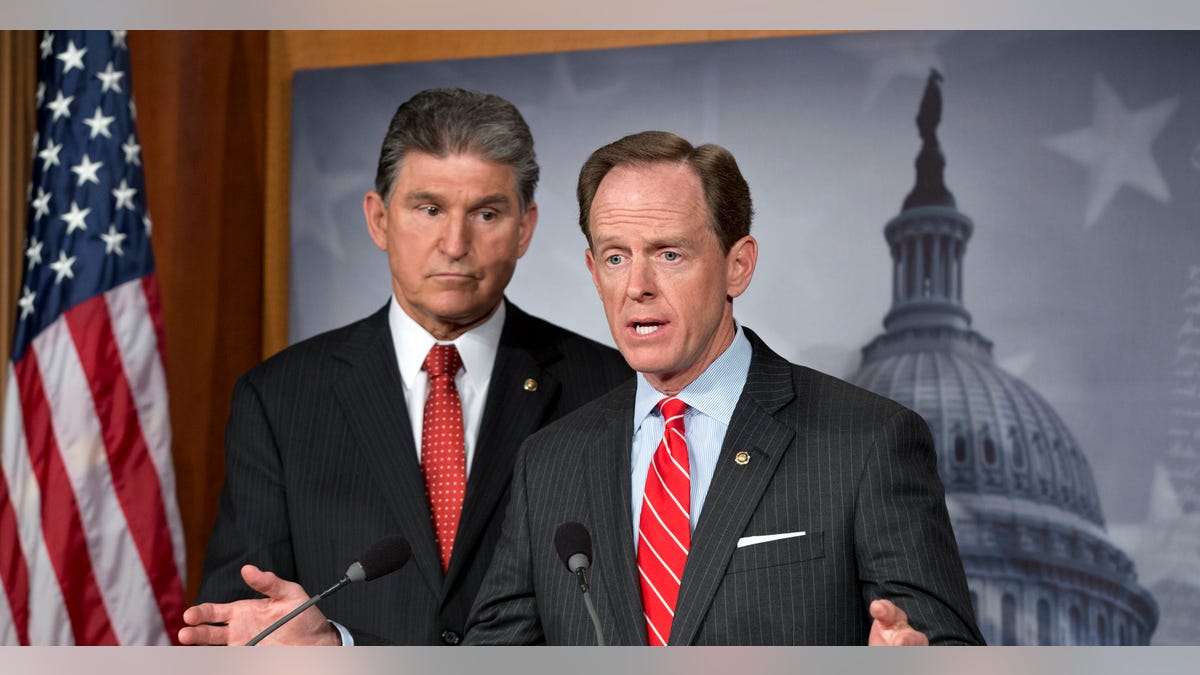
FILE: April 10, 2013: Sen. Joe Manchin, D-W.V., left, and Patrick Toomey, R-Pa., announce a deal on gun-control legislation, on Capitol Hill, in Washington, D.C. (AP)
The bipartisan deal on expanded background checks for gun buyers appeared Sunday to garner more Republican support, but Capitol Hill leaders could not say whether the overall gun-control bill will have enough votes as the full debate begins this week.
The legislation will need 60 votes to pass in the chamber, which means it will need Republican support as well as support from Senate Democrats facing re-election in districts with a strong tradition of gun rights.
"It's an open question as to whether or not we have the votes,” Pennsylvania Republican Sen. Pat Toomey told CNN’s “State of the Union.” “I think it's going to be close."
Toomey joined West Virginia Democratic Sen. Joe Manchin in crafting the background proposal, which would cover Internet and gun show purchases but would still exempt sales between family members.
Background checks currently apply only to transactions handled by the country's 55,000 licensed gun dealers.
New York Sen. Chuck Schumer -- who has worked since January on a larger plan to curb gun violence that could win bipartisan support -- told ABC’s “This Week” he has strong support from fellow Democrats.
“But … we're working really hard to maximize both the number of Democrats who will be the overwhelming majority of those who vote for it and a number of Republicans,” he said.
Senate Democrats and others have been trying to fulfill President Obama’s second-term priority of curbing gun violence since the December 2012 shootings at a Connecticut elementary school in which 20 first-graders and six adults were killed.
However, the effort has faced strong opposition on Capitol Hill and from such major gun lobby groups as the National Rifle Association.
Plan to ban high-capacity gun magazine clips and re-institute a ban on semi-automatic weapons have already been removed from the legislation, for lack of support. However, they could re-emerge as Senate amendments.
The full Senate debate is expected to begin Monday, after enough senators voted last week to stop a Republican-led effort to block the legislation from going forward.
Among the Republicans to express support Sunday was Sen. Susan Collins, a moderate Republican from Maine.
The plan would "strengthen the background check system without in any way infringing on Second Amendment rights," she said in a statement.
However, "it is impossible to predict at this point" what will be in a final bill, she added.
Arizona Sen. John McCain, who has a B+ rating from the NRA, told CNN that he was "very favorably disposed" to the Manchin-Toomey proposal.
"I appreciate their work," he said. "And the American people want to do what we can to prevent these tragedies. And there's a lot more that needs to be done, particularly in the area of mental health."
It was in McCain's home state that a gunman with schizophrenia shot then-Rep. Gabrielle Giffords in the head during a 2011 rampage in Tucson that left six people dead.
Collins and Sen. Mark Kirk of Illinois are the only two Republicans who are expected to vote for the compromise as of now.
On Sunday, Manchin urged lawmakers to read the 49-page proposal. He said it should dispel any misconceptions about infringing on the constitutional right to bear arms.
The proposal, in fact, expands firearms rights by easing some restrictions on transporting guns across state lines, protects sellers from lawsuits if buyers passed a check but later used a gun in a crime and lets gun dealers conduct business in states where they don't live.
However, Manchin also acknowledged the vote would be tight.
“We're close,” he told CBS’ “Face the Nation.” “We need more."
The compromise, if successful, would be added to overall legislation to strengthen laws against illegal gun trafficking and to increase slightly school-security aid.
Other additions to the legislation also are expected to be debated this week, including a measure that would allow concealed hand gun permits issued by one state to be accepted nationwide as a de facto background check.
The Associated Press contributed to this report.




